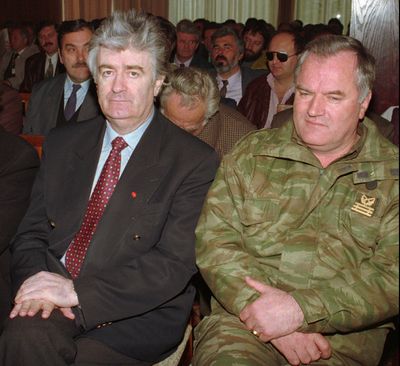War crimes fugitive Mladic arrested in Serbia

BELGRADE, Serbia — Gen. Ratko Mladic, the brutal Bosnian Serb general suspected of leading the bloody massacre of 8,000 Muslim men and boys, was arrested in an early morning raid today in Serbia after more than a decade hiding from genocide charges, the country’s president said.
The arrest 16 years after Mladic was indicted by the U.N. war crimes tribunal could be a jolt for Serbia’s lagging efforts to join the European Union. The country has been under intense pressure from the international community to catch Europe’s most wanted war crimes suspect and the EU has insisted on his arrest as a condition for its membership bid.
U.N. prosecutors have said they believed the suspect in the worst massacre in Europe since World War II was hiding in Serbia under the protection of hardliners who consider him a hero for his role in Bosnia’s 1992-95 ethnic war.
Belgrade’s media said Mladic was arrested in Lazarevo, a village some 100 kilometers (60 miles) northeast of Belgrade, at the home of relatives. B-92 radio said Mladic was not in disguise when arrested, unlike wartime Bosnian Serb president Radovan Karadzic, who was arrested in Belgrade in 2008 posing as a New Age guru, with long white hair and a beard.
Villagers told The Associated Press that the dawn action by Serbian security officers appeared to be swift and quiet.
“They didn’t even wake us up,” a man who identified himself only as Zoran for fear of reprisals said. “We learned about the arrest only in the morning.”
The general earned a reputation as a cold and ruthless killer, personally leading his troops in the bloody Serb onslaught against the U.N.-protected Srebrenica enclave in Bosnia. Just hours before the slaughter, Mladic handed out candy to Muslim children in the town’s square, assuring them everything would be fine and patting one child on the head. Then the shootings began — and the bodies of the victims were bulldozed into mass graves.
The town’s name has become nearly synonymous with the horrible bloodshed of the Balkan conflicts.
“We ended a difficult period of our history and removed the stain from the face of the members of our nation wherever they live,” President Boris Tadic told reporters in announcing the arrest.
Mladic will be extradited to the war crimes tribunal in The Hague, Netherlands, he said. He did not specify when, but said “an extradition process is under way.” Justice officials say it will take at least a week before he is handed over.
In Bosnia, the head of a group of victims’ family members formed to keep the pressure on war crimes investigators, welcomed the arrest. But, added Munira Subasic, “I’m sorry for all the victims who are dead and cannot see this day.”
Serbia has been under intense scrutiny over Mladic, with the chief U.N. war crimes prosecutor, Serge Brammertz, complaining earlier this month that authorities were not doing enough to capture him and other war crimes fugitives.
Brammertz’s regular reports on Serbia’s compliance are crucial for the Balkan country’s efforts to become an EU member candidate. On Thursday, he called justice for the victims of Mladic’s alleged crimes in Bosnia “long overdue.”
The victims “endured unimaginable horrors — including the genocide in Srebrenica,” Brammertz said in a statement Thursday.
Serbia’s war crimes office said the arrest represents “the fulfillment of justice.”
Croatian media, which first broke the story, said police there got confirmation from their Serbian colleagues that DNA analysis confirmed Mladic’s identity.
In Brussels, NATO Secretary-General Anders Fogh Rasmussen hailed the arrest, saying Thursday that almost 16 years since Mladic’s indictment for genocide “his arrest finally offers a chance for justice to be done.”
Tens of thousands of NATO troops were deployed to Bosnia in 1995 to safeguard a U.S.-sponsored peace agreement between that nations’ warring factions. They have since been withdrawn and replaced by a much smaller EU force.
The White House congratulated Serbian authorities on Mladic’s arrest and said his capture shows that justice eventually will come to those who perpetrate crimes against humanity.
“Our thoughts and prayers are with the families of the victims of so many people who suffered under the violence and tyranny of Mladic,” said deputy national security adviser Ben Rhodes, who spoke in Deauville, France, where President Barack Obama was attending an economic summit.
In 1995, the U.N. had declared Serb-besieged Srebrenica a protected area for civilians. But the few hundred Dutch Blue Helmets on the ground were left short of credible weaponry or a clear mandate to protect the town.
Srebrenica fell to the Serbs after senior U.N. commanders dithered on Dutch requests for air strikes and its overwhelmingly Bosnian Muslim residents swarmed the U.N. military base, seeking refuge. But the peacekeepers allowed the Serbs to take away the townspeople when Mladic said they would not be harmed.
Since the massacre, the bodies of thousands of the victims have been recovered, identified through DNA tests and laid to rest.